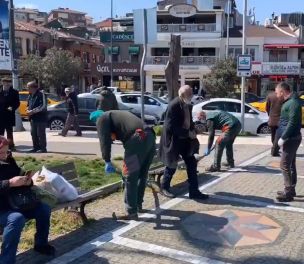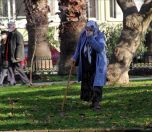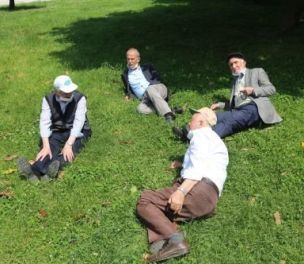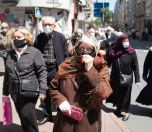* Some municipalities have temporarily removed park benches - AA / Eskişehir
Click to read the article in Turkish / Kurdish
In a statement released by the Ministry of Interior on Twitter at around 7 p.m. today (March 21), it has been announced, "As of March 21 Saturday at 24:00, our citizens who are 65 years and older and who also have chronic diseases will be restricted from going out in public and walking in open areas such as parks and gardens under the Article 11 of the Law for Provincial Administration and the Article 27 of the Law on Public Health."
The Ministry has posted te below tweet:
DUYURU
— T.C. İçişleri Bakanlığı (@TC_icisleri) March 21, 2020
21 Mart Cumartesi saat 24.00 itibariyle 65 yaş ve üstü, ayrıca kronik rahatsızlığı olan vatandaşlarımızın ikametlerinden dışarı çıkmaları, park, bahçe gibi açık alanlarda dolaşmaları sınırlandırıldı.
Ayrıntılı bilgi saat 19.30’da vatandaşlarımıza açıklanacaktır.
Following this tweet, the Ministry has shared the full circular letter sent to the Governor's Offices of all 81 provinces in Turkey.
The circular entitled "Circular Letter on Curfew for Citizens 65 Years and Older and Chronically Ill" has stressed that Covid-19 "risks human life by causing serious health problems for the ones who are 65 years and older, whose immune systems are weak, who have a chronic pulmonary disease, asthma, KOAH, cardiac/vascular disease, kidney, hypertension and liver diseases and who use medicine impairing the immune system."
Accordingly, the Ministry of Interior has ordered the Governor's Offices to "swiftly take necessary measures to impose a curfew on the citizens 65 years and older and the ones who have the aforementioned chronic diseases by restricting them from leaving their residences, walking in open areas and parks and using public transportation."
Within this context, the Ministry has also announced that an "Aged 65 and Older Loyalty Social Support Group" will be established and chaired by the Governor's and Sub-Governor's Offices to meet the basic needs of citizens 65 years and older and chronically ill so that especially the ones who live alone and cannot meet their demands by themselves will not have any grievances as a result of the curfew.
The Group will consist of representatives from public institutions and organizations, local administrations, the Disaster and Emergency Management Presidency (AFAD), Red Cross and non-governmental organizations to be designated by the province/district security director, province/district gendarmerie commander, governor/sub-governor.
According to the circular, the citizens restricted from going out can also call 112 emergency service line, 155 police emergency line and 156 gendarmerie emergency line to inform them about their needs. Public officers and vehicles, especially law enforcement officer, will be appointed to respond to these calls and provide the requested services.
Coronavirus cases in Turkey and the worldThe virus emerged in Wuhan, China last December, and has spread to at least 146 countries and territories. The World Health Organization declared the outbreak a pandemic. Out of more than 287,000 confirmed cases, the death toll now nears 12,000, while almost 90,000 have recovered, according to the data compiled by the U.S.-based Johns Hopkins University. Turkey currently has 670 confirmed cases, and the death toll stands at nine. You can see the number of coronavirus cases and death toll by countries in below interactive map shared by Washington University: |
How to protect oneself from the new Coronavirus?According to the World Health Organization (WHO), the protective measures against the new coronavirus (Covid-19) can be briefly listed as follows: Wash your hands frequently Regularly and thoroughly clean your hands with an alcohol-based hand rub or wash them with soap and water. Why? Washing your hands with soap and water or using alcohol-based hand rub kills viruses that may be on your hands. Maintain social distancing Maintain at least 1 metre (3 feet) distance between yourself and anyone who is coughing or sneezing. Why? When someone coughs or sneezes they spray small liquid droplets from their nose or mouth which may contain virus. If you are too close, you can breathe in the droplets, including the COVID-19 virus if the person coughing has the disease. Avoid touching eyes, nose and mouth Why? Hands touch many surfaces and can pick up viruses. Once contaminated, hands can transfer the virus to your eyes, nose or mouth. From there, the virus can enter your body and can make you sick. Practice respiratory hygiene Make sure you, and the people around you, follow good respiratory hygiene. This means covering your mouth and nose with your bent elbow or tissue when you cough or sneeze. Then dispose of the used tissue immediately. Why? Droplets spread virus. By following good respiratory hygiene you protect the people around you from viruses such as cold, flu and COVID-19. If you have fever, cough and difficulty breathing, seek medical care early Why? National and local authorities will have the most up to date information on the situation in your area. Calling in advance will allow your health care provider to quickly direct you to the right health facility. This will also protect you and help prevent spread of viruses and other infections. |
(DB/SD)




.jpg)










